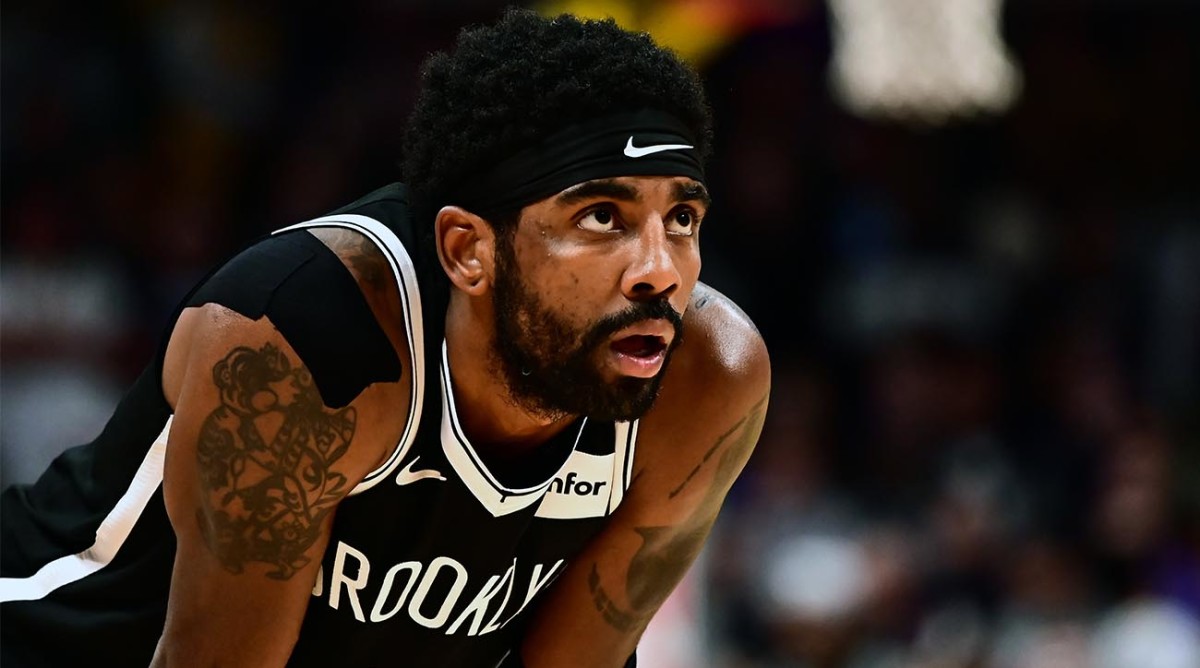NBA Must Not Let Season's Return Distract From Black Lives Matter Movement
The NBA intends to resume its season on July 30.
It remains to be seen how many players will be part of it.
The latest development: A conference call among 80-plus NBA players on Friday night—details of which were first reported by The Athletic—led by Nets guard Kyrie Irving. Irving, according to a player on the call, came out strongly against going to Orlando to resume the season. Irving’s position: NBA players should not become the distraction that takes away from the social justice movement that has swept through the U.S. in the aftermath of the killing of George Floyd.
Irving’s position is understandable, and it’s shared widely. The minute NBA teams report for training camp, when media gets regular access for the first time in months, the narrative changes. Stories about the resumed season will flood the internet. It will be James Harden/Russell Westbrook, Ben Simmons's return and the race for the final playoff spot in the West. Everything about LeBron James will be put under a microscope.
Will the social justice movement get lost in the shuffle? You would like to think not, but remember—we are a country that moves on from everything. It’s been eight years since 20 kids were shot to death at Sandy Hook, and nothing changed. Unarmed black men and women are gunned down with alarming frequency, and nothing has changed. Legislation is stalled by aging white men owned by special interests while powerful police unions stand in the way of structural reform. This feels like a movement, a turning point. But who’s to say the return of sports won’t push even this into the shadows?
Texted one NBA player, “I have a lot of anxiety about that.”
There isn’t one singular opinion among league ranks. “Some of us want to hoop and compete,” tweeted Lakers guard Kyle Kuzma. “Don’t get that twisted.” Indeed, there are many players who just want to play. Three months on lockdown can make double sessions sound appealing. For most, the time spent away from the game is the longest they have ever been away.
Some of us want to hoop and compete don’t get that twisted.... https://t.co/GoRnvy6rzN
— kuz (@kylekuzma) June 12, 2020
There are those who see a return as a way to advance the movement. James was reportedly not on the Irving-led call. James has always believed in the power of his platform. In 2017, when Donald Trump declared war on NFL players kneeling during the national anthem, James was asked if he would ever take a knee. “My voice is stronger than my knee,” James said. James has more than 66 million followers on Instagram. He has another 46 million on Twitter. Recently, James founded More Than a Vote, an organization created to fight voter suppression. James’s season could extend as long as Oct. 12—just a few weeks before Election Day.
Concerns extend beyond social justice, too. Health, for one. The COVID-19 crisis remains a constant threat. Florida, one of the first states to re-open, has reemerged as a hot spot. On Saturday, the Florida Department of Health reported more than 2,500 new cases of the coronavirus—a state record. Central Florida, where the NBA will create its bubble, has been hit particularly hard. Little is known about the long-term effects of the coronavirus, and players are wary about the possibility of infecting family members, some who may be high risk. Disney employees servicing the bubble reportedly will not be quarantined in it, which would seem to create less of a bubble than a spaghetti strainer, regardless of what kind of precautions staffers take.
There are physical concerns. Donovan Mitchell was among the players who pointed out the increased injury risk, The Athletic reported. Mitchell is in line for a max-level extension this summer. Dozens of other players are set to hit free agency in the next few months, too. For some, a major injury could be the difference between millions in guaranteed dollars or a spot in the NBA’s unemployment line.
And, if we’re being honest, there are lifestyle issues. Many players, especially the younger ones, aren’t keen on the possibility of a few months confined in the sweltering Florida heat, isolated in designated locations, away from family and friends.

The NBA has to thread a tight needle here. All these concerns are legitimate. Quarrel with the timing of Irving’s push—several team and league officials have wondered why this is just coming up now, when the league and players union are close to finalizing restart plans—but don’t doubt his sincerity. White America can’t understand Black America’s suffering, can’t understand the fear that creeps in before a traffic stop, can’t understand the pain of watching yet another life senselessly lost. Scores of athletes have come forward with stories that have shaped their views. Irving’s, similarly, should not be discounted.
The NBA—Adam Silver—has to find a way to make it all work. Irving has pushed his position to the forefront, and the league must respond. Many NBA stars are on board with a return, now Silver must come up with a solution that brings the rank-and-file with them. Silver has been adamant about preserving the integrity of the postseason, and any mass defection would decimate it. The NBA has paid lip service to the social justice cause in recent weeks, now actions must be added to reinforce it, to make players believe that playing, not sitting, is the strongest way to further a movement that needs to be furthered.
This is a pivotal moment.
More than anything, the NBA must get it right.
